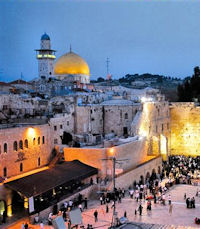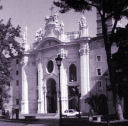» Enjoy our Liturgical Seasons series of e-books!
“As the journey of Advent continues, as we prepare to celebrate the nativity of Christ, John the Baptist's call to conversion sounds out in our communities. It is a pressing invitation to open our hearts and to welcome the Son of God Who comes among us to make divine judgement manifest. The Father, writes St. John the Evangelist, does not judge anyone, but has entrusted the power of judgement to the Son, because He is the Son of man.
“And it is today, in the present, that we decide our future destiny. It is with our concrete everyday behavior in this life that we determine our eternal fate. At the end of our days on earth, at the moment of death, we will be evaluated on the basis of our likeness or otherwise to the Baby Who is about to be born in the poor grotto of Bethlehem, because He is the measure God has given humanity.
“Through the Gospel John the Baptist continues to speak down the centuries to each generation. His hard clear words bring health to us, the men and women of this day in which even the experience and perception of Christmas often, unfortunately, reflects materialist attitudes. The 'voice' of the great prophet asks us to prepare the way for the coming Lord in the deserts of today, internal and external deserts, thirsting for the water of life which is Christ.” — Benedict XVI
Station Church Information >>>
Today's Optional Memorial of Our Lady of Loreto is superseded by the Sunday Liturgy.
Commentary on the Mass Readings for the Second Sunday of Advent, Cycle B:
The Second Reading is from the Second Letter of St. Peter 3:8-14. "We wait for new heavens and a new earth." That is the principal reason for our existence on this earth. We have a number of secondary purposes to fulfill, but each must contribute toward our attaining the primary and principal purpose: our eternal existence in heaven. We are intended by God to be citizens of the "new universe." He has given us our citizenship papers. He has most carefully mapped the road we should travel. He has given us all the material and spiritual helps we need on the journey but, God though he be, he cannot bring us to heaven unless we cooperate with him.
The Gospel is from the Gospel of Mark 1:1-8 "The beginning of the gospel of Jesus Christ, the Son of God." In twelve words St. Mark sums up the initiation of the greatest event that ever occurred in our human history, an event whose culmination would be not on earth but in heaven. God fulfilled the plan he had for us when creation began. He raised us up to the dignity of divine sonship by the Incarnation. The eternal Son of God "humbled himself" and joined our human nature to his divinity, thus making us his brothers and capable of sharing with him the eternal kingdom of his Father. Mark's story was, in fact, the greatest "good news" that man had ever received on earth. It is still the greatest, most astounding and, at the same time, most consoling new for us today. Let each one of us ask himself today: am I for Christ or against him? Am I on the road to heaven or am I facing in the opposite direction?
Meditation: Jerusalem
Why "Jerusalem"? Excavations of ancient sites often reveal a number of strata. When enemies destroyed a city, a new one would rise on the same location, so that today there are several layers of remains, one city, as it were, above the other. Our Jerusalem likewise has four strata. The bottommost layer is the Jerusalem of the Jews, that venerable land where the Lord Jesus began His mission of redemption, where He suffered and died. This is the historical Jerusalem so dear to us Christians. Anyone making a pilgrimage to the Holy Land enters that ancient city with holy awe. That Jerusalem, however, lies buried deep.
Above the second stratum there arises a third, the heavenly Jerusalem at the end of time. Already now the Church sings of this Jerusalem. For during Advent we await the Savior who will appear on the Last Day to take all into "the new Jerusalem coming down from heaven."
Finally, there may be recognized a fourth Jerusalem, our souls in sanctifying grace. This city too must be adorned and prepared, for the King will want to enter. That is our present task.
On Epiphany, the climax to the current season, the Church will cry out: "Arise, shine, O Jerusalem, for the glory of the Lord has risen upon thee." That is the goal. Today we must prepare for the great King's visit to our city. The whole coming week must be devoted to it. The Church prays: "Awaken our hearts to prepare the way for Your only-begotten Son that we may serve Him with purified hearts."
In the time of the Roman Empire, rulers rode from city to city for the purpose of official visitations. Their appearance, called epiphany or parousia, was a great event, one preceded by months of preparation. Something analogous takes place in the Jerusalem of our souls. From a high watchtower we see the Lord coming afar off. Suddenly John the Baptist appears; he hurries into the city to announce the King's approach. God condescends to manifest Himself to us in grace; but He demands the proper reception.
Second Sunday of Advent For more on Santa Croce in Gerusalemme, see: For further information on the Station Churches, see The Stational Church.![]() Jesse Tree, Day 8 ~ Jacob
Jesse Tree, Day 8 ~ Jacob
Jesse Tree Overview
The First Reading is from the Book of the Prophet Isaiah 40:1-5, 9-11. To help us prepare for the coming of Christ at Christmas, the Church recalls the prophecies of the great Isaiah on each of the four Sundays of Advent. The prophet's words of comfort and consolation, addressed to his fellow exiles in Babylon, apply to Christian with infinitely greater force and meaning. The exiles were told that their liberation from enemy captivity was at hand. God would bring them back to Judea, to end their earthly days in freedom, but not without much struggle and strife. These same words have their real fulfillment in Christ. For us they have a meaning which goes beyond the confines of this world and of this limited life. The liberation from Babylon was but a shadow of the messianic redemption brought to all men by the incarnation, death and resurrection of Christ.
—Excerpted from The Sunday Readings by Fr. Kevin O'Sullivan, O.F.M.
In Palestine Christians gather today in Jerusalem for the celebration of holy Mass. In Rome they proceed to the stational church "Holy Cross at Jerusalem" which serves to give the atmosphere of the Holy City.
 For us another has been built upon it, the Jerusalem of Christians, God's kingdom on earth, the holy Church. This city still stands; it is the one which the divine King will enter at Christmas. Now we understand why we will hear so much about Jerusalem during the coming week. We should now clean and adorn our city, improving its streets and avenues through which the Savior will make His entrance. As a motto we should take the words of the precursor, St. John the Baptist: "Prepare the way of the Lord, make straight His paths; let every valley be filled, every hill be leveled." Holy Mother Church's message today is that the Savior is coming to the Jerusalem of the Christians, to the Church.
For us another has been built upon it, the Jerusalem of Christians, God's kingdom on earth, the holy Church. This city still stands; it is the one which the divine King will enter at Christmas. Now we understand why we will hear so much about Jerusalem during the coming week. We should now clean and adorn our city, improving its streets and avenues through which the Savior will make His entrance. As a motto we should take the words of the precursor, St. John the Baptist: "Prepare the way of the Lord, make straight His paths; let every valley be filled, every hill be leveled." Holy Mother Church's message today is that the Savior is coming to the Jerusalem of the Christians, to the Church.
—Excerpted from The Church's Year of Grace by Pius Parsch

Station with Holy Cross In Jerusalem (Santa Croce in Gerusalemme):
The church in Rome appointed as the stational church for the Second Sunday of Advent is the Church of the Holy Cross in Jerusalem. Of old, salvation was of the Jews, but through them, and through this church, salvation is also given to the heathens. The Jerusalem, the Sion of today's liturgy, is the Holy Catholic Church, the vessel that contains Christ and his salvation. In the mind of the liturgy the figure applies also to each Christian soul, and to the church of stone in which we await the celebration of Mass in anticipation of the advent of our Redeemer (Baur, The Light of the World).







